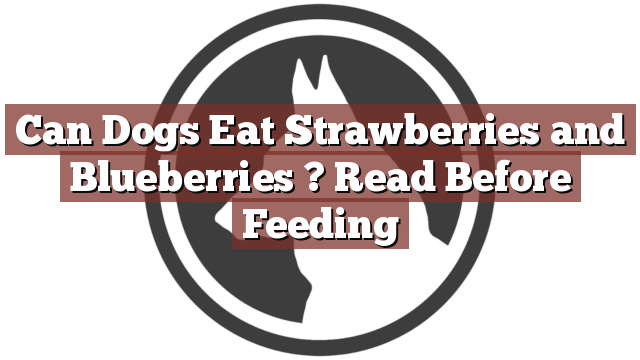Understanding Your Dog’s Dietary Needs
As a responsible dog owner, it is essential to understand your furry friend’s dietary needs. Providing a balanced and nutritious diet is crucial for their overall health and well-being. While dogs are primarily carnivores, they can also benefit from certain fruits and vegetables in moderation. However, it is important to remember that not all human foods are safe for dogs to consume. Therefore, before introducing any new food into your dog’s diet, it is essential to do your research and consult with a veterinarian.
Can Dogs Eat Strawberries and Blueberries? Read Before Feeding
Can dogs eat strawberries and blueberries? The answer is yes. These two fruits are generally safe for dogs to consume in small amounts. Strawberries and blueberries are packed with vitamins, minerals, and antioxidants that can help boost your dog’s immune system and promote overall health. However, it is important to feed them to your dog in moderation, as too much can lead to digestive upset or diarrhea. Additionally, it is crucial to prepare the fruits properly and remove any stems or leaves to prevent choking hazards.
Pros and Cons of Feeding Strawberries and Blueberries to Dogs
Feeding strawberries and blueberries to your dog can have several advantages. These fruits are low in calories and fat, making them a healthy and delicious treat for your canine companion. The natural sugars in strawberries and blueberries are also safer for dogs compared to artificial sweeteners found in some commercial dog treats. Moreover, these fruits contain fiber, which can aid in digestion and help regulate bowel movements.
However, there are a few things to consider before adding strawberries and blueberries to your dog’s diet. Some dogs may have allergies or sensitivities to certain fruits, so it is important to monitor your dog for any adverse reactions after feeding them. Additionally, moderation is key. While strawberries and blueberries are safe for dogs, overfeeding can lead to weight gain or other digestive issues. It is always best to introduce new foods gradually and in small quantities to avoid any potential problems.
Conclusion
In conclusion, when it comes to feeding your dog strawberries and blueberries, the answer is yes, they can enjoy these fruits in moderation. These fruits can provide a tasty and nutritious addition to your dog’s diet, offering vitamins, minerals, and antioxidants. However, it is crucial to be mindful of portion sizes and potential allergies or sensitivities. As with any new food, it is always recommended to consult with your veterinarian before introducing strawberries and blueberries into your dog’s regular diet. By doing so, you can ensure that you are making informed choices to keep your furry friend happy and healthy.
Thank you for taking the time to read through our exploration of [page_title]. As every dog lover knows, our furry friends have unique dietary needs and responses, often varying from one canine to another. This is why it's paramount to approach any changes in their diet with caution and knowledge.
Before introducing any new treats or making alterations to your dog's diet based on our insights, it's crucial to consult with a veterinarian about [page_title]. Their expertise ensures that the choices you make are well-suited to your particular pet's health and well-being.
Even seemingly harmless foods can sometimes lead to allergic reactions or digestive issues, which is why monitoring your dog after introducing any new food item is essential.
The content provided here on [page_title] is crafted with care, thorough research, and a genuine love for dogs. Nevertheless, it serves as a general guideline and should not be considered a substitute for professional veterinary advice.
Always prioritize the expert insights of your veterinarian, and remember that the health and happiness of your furry companion come first.
May your journey with your pet continue to be filled with joy, love, and safe culinary adventures. Happy reading, and even happier snacking for your canine friend!

